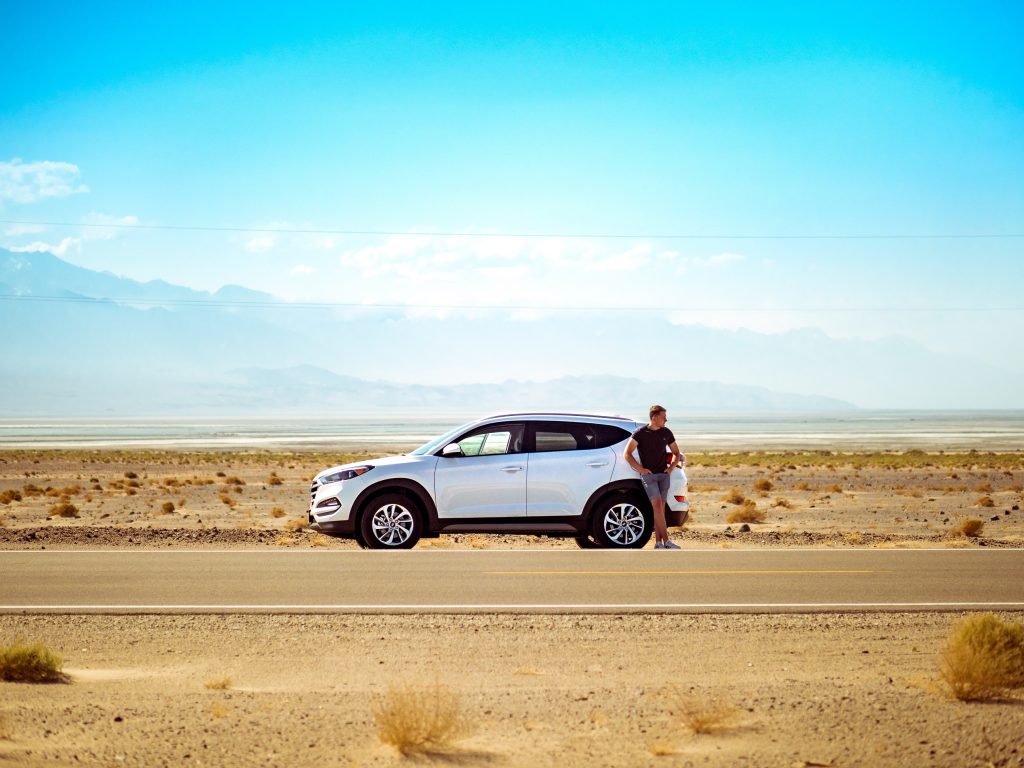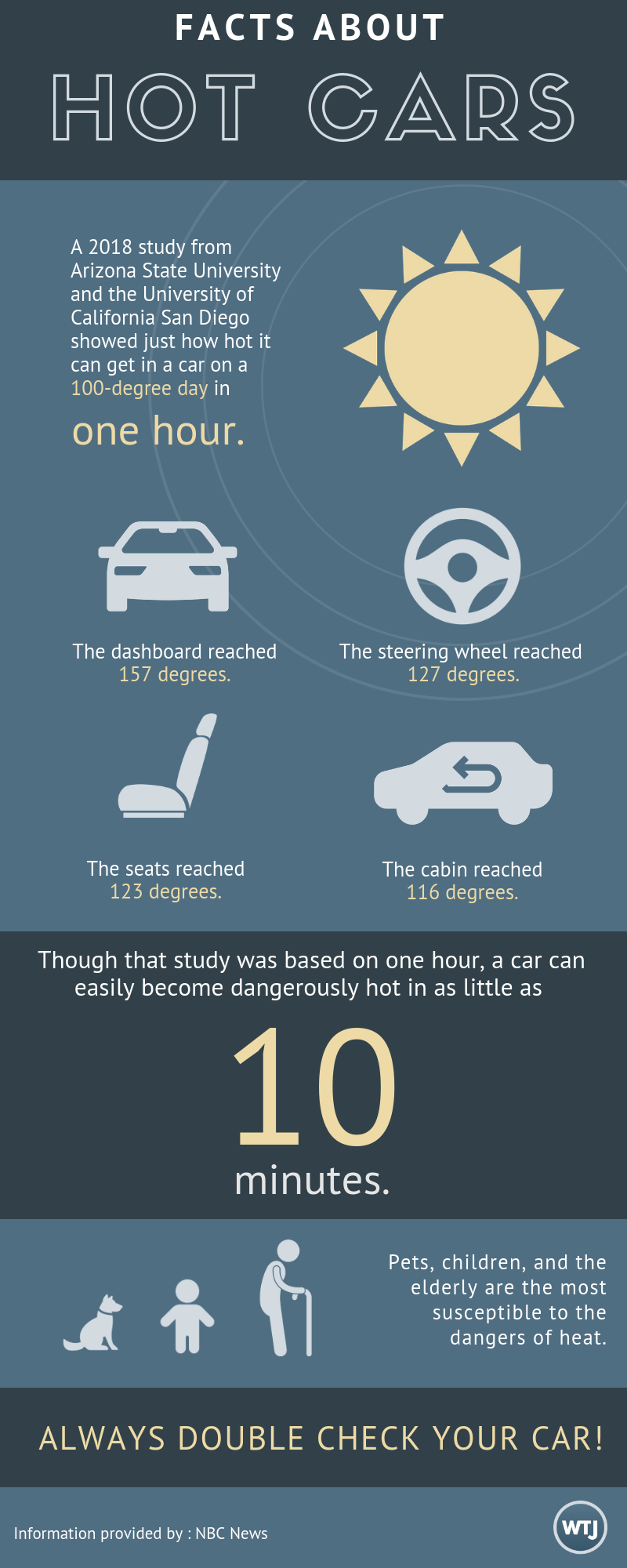 A car can become dangerously hot in just 10 minutes. That’s the amount of time it takes you to grab a gallon of milk from your local grocery store or drop something off at the post office.
A car can become dangerously hot in just 10 minutes. That’s the amount of time it takes you to grab a gallon of milk from your local grocery store or drop something off at the post office.
A 2018 study from Arizona State University and the University of California San Diego showed just how hot it can get for cars in either the sun or the shade. Inside an average vehicle parked in the sun on a 100-degree day for 60 minutes, the dashboard reached 157 degrees, the steering wheel 127 degrees, the seats 123 degrees, and the cabin 116 degrees. Even in the shade, the same car’s dashboard reached 118 degrees, the steering wheel 107 degrees, the seats 105 degrees, and the cabin 100 degrees (NBC News).
Children and the Elderly Are Particularly Vulnerable
It’s important to note that children and adults 65 or older are more susceptible to the dangers of heat. The elderly have a reduced capacity to release heat from their bodies because they have a diminished ability to perspire, limiting this cooling method. Similarly, small children have a smaller surface area with their skin, also limiting their ability to perspire and cool themselves. Both groups may also have an inhibited ability to communicate symptoms of heat-related injury; whether they are too young to understand or to speak, or they suffer from an illness that makes it more difficult to communicate.
People with chronic health problems or disabilities, who are not acclimated to hot weather, who overexert themselves, who are obese, or who use alcohol or drugs are also at a greater risk, according to the National Weather Service.
When Caregivers Leave Someone Behind
Lapses in memory can unfortunately happen to anyone. Someone can get distracted and leave a child in the car because the child is in a rear-facing car seat and the person doesn’t see him when exiting the vehicle. These incidents reach an entirely different level when a caregiver, whose job is to supervise a child or elderly person, leaves him or her in a hot car. Whether it’s a daycare staff member, nanny, or personal care aide, caregivers have a responsibility to maintain the safety of those whom they supervise.
In the summer of 2017, a 3-year-old Florida boy was found dead in a daycare van. The boy was left in the van for nearly 12 hours, when temperatures reached the low 90s with a heat index in the triple digits. In this case, the daycare worker failed to do a headcount when dropping kids off at the daycare center in the morning, and accidentally left the boy behind (Orlando Sentinel).
Hot Cars, Caregivers, and Texas Law
A parent or caregiver cannot leave a child 7 years old or younger unattended or with a child under 14 in a car for more than five minutes, according to the Texas Department of Family and Protective Services. Breaking this law is considered a class C misdemeanor, and if the child is injured, the punishment can be increased to a felony (DFW Child).
In addition to being bound by the law regarding leaving children in a vehicle, caregivers also take on separate legal liability when supervising children or the elderly. There are a few factors that need to be proved in order to make a case that a caregiver is financially liable for the victim’s injuries:
- The caregiver accepted the responsibility of supervising the child or elderly person.
- The caregiver failed to properly monitor the person under their care. There was an expected level of care that the caregiver did not meet.
- The injury was directly caused by the caregiver’s failure to monitor the child or elderly person.
In the case of the Florida daycare worker, it is fairly clear that she was negligent in her care, and liable for the boy’s death. She was an official caregiver who failed to take the proper steps to ensure the child’s safety, i.e., performing a head count, and the boy died as a direct result. The daycare that employed the caregiver could also be considered liable.
The death of a child or elderly person as a result of being left in a hot car is an unthinkable, completely preventable tragedy. Those who are careless in their duty to keep people safe should be held accountable.
If you or a loved one has experienced this lack of care, consider contacting a knowledgeable Dallas child injury attorney who can fight for the compensation and justice you deserve. Call Crowe Arnold & Majors, LLP at (214) 231-0555 today for a free consultation.

Please SHARE this knowledge by:
Embedding the infographic by copying and pasting the following code onto your website:
<div align=”center”><a href=”https://camlawllp.com/wp-content/uploads/2018/11/WTJohnson-hot-car.png” target=”_blank”><img src=”https://camlawllp.com/wp-content/uploads/2018/11/WTJohnson-hot-car.png” alt=”Hot Car Infographic” width=”410″ border=”0″ class=”imgcenter” /></a> <p align=”center”><a href=”https://camlawllp.com/wp-content/uploads/2018/11/WTJohnson-hot-car.png” target=”_blank”>See Larger Image</a></div>
Linking to this page on your own website:
<a href=”https://camlawllp.com/blog/summer-arrived-hot-car-danger/”>Crowe Arnold & Majors, LLP Presents: Hot Car Danger Infographic</a>





